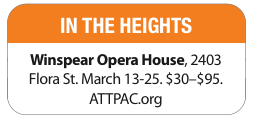Lin-Manuel Miranda, B’way’s reigning rappin’ Latino, brings infectious energy to ‘In the Heights’

KARMA AND MIRANDA | By age 30, Lin-Manuel Miranda, who recently spoke at the Nasher Salon Series, had already worked with his heroes of musical theater, including Stephen Sondheim. (Arnold Wayne Jones/Dallas Voice)
ARNOLD WAYNE JONES | Life+Style Editor
When Lin-Manuel Miranda was just a teenager at Wesleyan University, he spent a furious few weeks composing the music for a show about his favorite neighborhood in New York City, Washington Heights, for a school theater fest. It wasn’t unusual for savvy New York theater nerds to undertake such a daunting experience — after all, who but a few parents and fellow drama majors were ever gonna see it? Oh, he probably fantasized about seeing his name up in lights on Broadway one day, but that was, at most, an afterthought.
But something unexpected happened that changed the course of his life. He couldn’t get any musicians to play his music live at the performance — they were all too busy. So he compromised: He got musicians together to pre-record the tracks for the singers. And to pay for that recording, he recorded the songs as well to sell in the lobby as a cast recording.
What college production has a cast recording?
 The answer is, In the Heights, which won the 2008 Tony Award for best musical, as well as Miranda the best score Tony and a nomination for best actor. He was 28 at the time.
The answer is, In the Heights, which won the 2008 Tony Award for best musical, as well as Miranda the best score Tony and a nomination for best actor. He was 28 at the time.
Miranda’s rise-to-success story could almost stop there, so thrilling is it. But in the four short years since In the Heights opened, Miranda has gone on to write the music for another musical — Bring It On, which just recently played Fair Park — and adapt Spanish dialogue and lyrics to a revival of West Side Story (at the personal request of Arthur Laurents and Stephen Sondheim). If anyone deserved to act like the golden child, it’s him.
But Miranda, now 32 (“a little younger than hip-hop itself,” he jokes), is as friendly and pleasant as can be. Mischievously handsome, with big brown eyes and an effusive energy that never seems manic, he’s almost as gobsmacked by his incredible luck as his fans.
Not all of his success is totally unexpected. From an early age, Miranda was a prodigious talent, composing his first song (there is evidence of it on his Fisher-Price tape recorder) at age 4. He attended an arts magnet school in Manhattan, and began freestyle rapping as a teenager (an influence apparent in his scores for Heights and Bring It On). He’d composed jingles for political campaigns almost before he could vote.
But he’s still the Puerto Rican kid from Upper Manhattan who hit the big time merely writing about what he saw and knew.
“When I was in the show, I moved to 61st Street and I was miserable,” he says during a stopover at the Nasher Sculpture Center earlier this week. He still lives five blocks from where he grew up.
Like just about everyone in musical theater, Miranda — who is straight — owes a lot to the gay men he has worked with over the years. His eyes balloon with incredulity when he talks about working with Laurents and Sondheim.
“There’s no way to describe it other than to call it a fever dream,” he gushes. “These are heroes of mine. Arthur calls me to vet the Spanish. I sat next to him during some of the auditions. Steve was so generous with me about changing the lyrics, which was like working with a gigantic jigsaw puzzle.”
He signed on to do Bring It On for one reason, he says: For the chance to work with gay book writer Jeff Whitty (Avenue Q).
“When I heard about the idea for a musical about a cheerleading movie, I did what most people do: I just laughed. But Jeff had such a strong story — he really lives up to his name — and I wanted to see what [director/choreographer] Andy [Blankenbuehler] would bring to it.”
And although he was thrilled to win the Tony, just the process was a daze, getting to meet heroes and walk the red carpet with folks far more famous than he. In fact, his favorite Tony experience happened last year, when he wasn’t even nominated.
“I was in the basement of the Beacon Theatre, writing Neil Patrick Harris’ rap,” he explains. Harris, who hosted the Tony Awards, called Miranda out of the blue and asked him to write freestyle about the ceremony as it happened. “We were there working on everything as it happened, trying to come up with a rhyme for Larroquette,” Miranda laughs. “Then the fearless Neil Patrick Harris came to us, went through it once and performed it live at the end of the show. It was pretty tremendous.”
This article appeared in the Dallas Voice print edition March 9, 2012.

This was an absolutely great article until the mention of sexual orientation. What does that have to do with Miranda’s success? If it doesn’t DIRECTLY pertain to the reason he rose to fame, why even mention it? Does it make any sense to identify Miranda as straight and Whitty as gay? No. No effect whatsoever, so leave it out next time.
RE: Stumped’s comment … perhaps because THE VOICE is a weekly newspaper that caters to the GAY community?